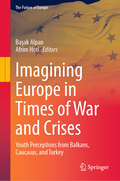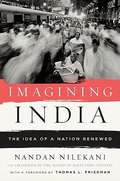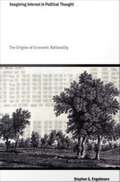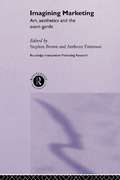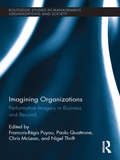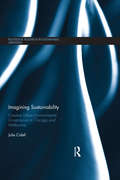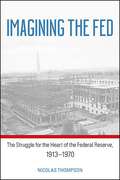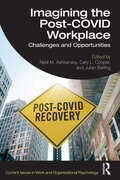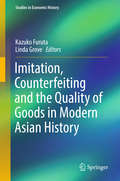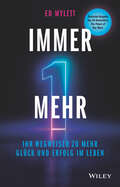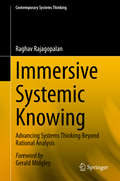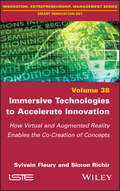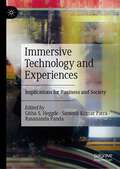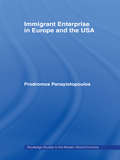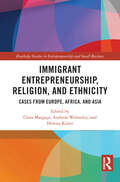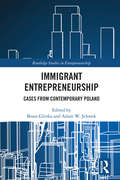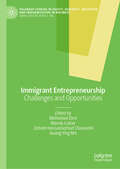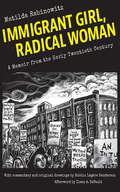- Table View
- List View
Imagining Europe in Times of War and Crises: Youth Perceptions from Balkans, Caucasus, and Turkey (The Future of Europe)
by Başak Alpan Afrim HotiThis book aims to explore the perceptions of the EU integration by the young population in its “periphery”. It thereby bridges the gap between perceptions studies, youth studies, and the center-periphery conceptual framework. The chapters in the volume make use of data generated from focus group meetings with university students aged between 18-30 (which is the age range generally used by the European Social Survey to group young citizens) in Romania, Kosovo, Albania, North Macedonia, Georgia and Turkiye.
Imagining India
by Nandan NilekaniIndian software entrepreneur Nandan Nilekani has written the definitive book about modern India. Nilekani gives us a fascinating new perspective for the twenty-first century, defying received and imported wisdom, and showing us what is really at stake in the world's largest democracy. He reveals why India's huge population has now become her greatest strength; how information technology is bringing the benefits of globalization; why rapid urbanization is transforming social and political life; and how we can learn from India's difficult journey towards a single internal market. He also gets to the heart of debates about labour reform, the social security system, higher education and the role of the state. And he asks the key questions of the future: how will India as a global power avoid the mistakes of earlier development models? Will further access to the open market continue to stimulate such extraordinary growth? And how will all this affect - and be shaped by - her young people?
Imagining India: इमॅजिनिंग इंडिया
by Nandan Nilekani Aparna Velankarसमकालीन संदर्भात अत्यंत महत्त्वाच्या अशा या पुस्तकात भारताचा प्रदीर्घ इतिहास, गुंतागुंतीचे वर्तमान आणि अनेक शक्यतांना जन्माला घालणारे भविष्य यांचा एक सुसंगत असा अन्वय लावण्याचा प्रयत्न नंदन निलेकणी यांनी केला आहे. स्वातंत्र्योत्तर काळातल्या समाजवादी धोरणांमागचे तत्कालीन उद्देश कितीही चांगले असले, तरी प्रत्यक्ष व्यवहारात मात्र या धोरणांची परिणती लोकशाही खिळखिळी करणाऱ्या कुचंबल्या वर्तमानात कशी आणि का झाली, याचे सखोल विवेचन निलेकणी यांनी केले आहे. वर्तमान आणि भविष्य यांचा खंबीर आधार म्हणून उदयाला आलेली भारतातील तरुण लोकसंख्येची दमदार शक्ती हा कळीचा मुद्दा का आहे; याचे विश्लेषण हा या पुस्तकाचा महत्त्वाचा भाग. माहिती तंत्रज्ञानाच्या क्षेत्रात झपाट्याने होत जाणाऱ्या क्रांतीमुळे केवळ व्यापार, उद्योग आणि सरकारी कारभारातच नव्हे; तर बहुसंख्य भारतीयांच्या आयुष्यात किती रोमांचक परिवर्तन घडते आहे; याचे अत्यंत रोचक वर्णन या पुस्तकात आहे. जातीच्या गणितांवर बेतलेले राजकारण, कामगार क्षेत्रात दीर्घकाळ प्रलंबित राहिलेल्या सुधारणा, पायाभूत सुविधांची उभारणी, उच्च शिक्षणाचे क्षेत्र आणि भारतातला इंग्रजी भाषेचा वाढता प्रभाव यांसारख्या कळीच्या वादग्रस्त मुद्द्यांचे नंदन निलेकणी यांनी विस्ताराने आणि संपूर्णत: नव्या दृष्टिकोनांसह विस्तृत विवेचन केले आहे. जिथे काही बलाढ्य कंपन्यांच्या वार्षिक उलाढालीचे आकडे हे छोट्या देशांच्या संपूर्ण अर्थव्यवस्थेपेक्षाही मोठे होत चालले आहेत, अशा जागतिकीकरणाच्या प्रक्रियेत शासन संस्थांची नेमकी भूमिका काय; याचाही ऊहापोह निलेकणी यांनी केला आहे. सार्वजनिक आयुष्यातल्या प्रत्येक क्षेत्रात नवविचारांची-नवनिर्मितीची आणि सुधारणांची गरज अधोरेखित करणारे हे पुस्तक भविष्य तोलून धरू शकतील, अशा नव्या संकल्पना समोर ठेवते. खऱ्या अर्थाने सर्वसमावेशक असणाऱ्या लोकशाही व्यवस्थेपासून सामाजिक सुरक्षेच्या छत्रापर्यंत आणि सार्वजनिक आरोग्याच्या सक्षम क्षेत्रापासून शाश्वत ऊर्जा-धोरणापर्यंतच्या या नव्या संकल्पना वर्तमान राजकारणाला ओलांडून पुढे येतील आणि त्यातूनच देशाचे भविष्य आकाराला येईल, असा युक्तिवाद नंदन निलेकणी यांनी या पुस्तकात मांडला आहे.
Imagining Interest in Political Thought: Origins of Economic Rationality
by Stephen G. EngelmannImagining Interest in Political Thought argues that monistic interest--or the shaping and coordination of different pursuits through imagined economies of self and public interest--constitutes the end and means of contemporary liberal government. The paradigmatic theorist of monistic interest is the English political philosopher Jeremy Bentham (1748-1832), whose concept of utilitarianism calls for maximization of pleasure by both individuals and the state. Stephen G. Engelmann contends that commentators have too quickly dismissed Bentham's philosophy as a crude materialism with antiliberal tendencies. He places Benthamite utilitarianism at the center of his account and, in so doing, reclaims Bentham for liberal political theory. Tracing the development of monistic interest from its origins in Reformation political theory and theology through late-twentieth-century neoliberalism, Engelmann reconceptualizes the history of liberalism as consisting of phases in the history of monistic interest or economic government. He describes how monistic interest, as formulated by Bentham, is made up of the individual's imagined expectations, which are constructed by the very regime that maximizes them. He asserts that this construction of interests is not the work of a self-serving manipulative state. Rather, the state, which is itself subject to strict economic regulation, is only one cluster of myriad "public" and "private" agencies that produce and coordinate expectations. In place of a liberal vision in which government appears only as a protector of the free pursuit of interest, Engelmann posits that the free pursuit of interest is itself a mode of government, one that deploys individual imagination and choice as its agents.
Imagining Marketing: Art, Aesthetics and the Avant-Garde (Routledge Interpretive Marketing Research Ser.)
by Stephen Brown Anthony PattersonImagination is a word that is widely used by marketing practitioners but rarely examined by marketing academics. This neglect is largely due to the imagination's 'artistic' connotations, which run counter to the 'scientific' mindset that dominates marketing scholarship. Of late, however, an artistic 'turn' has taken place in marketing research, and
Imagining Organizations: Performative Imagery in Business and Beyond (Routledge Studies in Management, Organizations and Society)
by Nigel Thrift Paolo Quattrone Francois-Régis Puyou Chris McLeanOrganizations rely extensively upon a myriad of images and pictorial representations such as budgets, schedules, reports, graphs, and organizational charts to name but a few. Visual images play an integral role in the process of organizing. This volume argues that images in organizations are ‘performative’, meaning that they can be seen as performances, rather than mere representations, that play a significant role in all kind of organizational activities. Imagining Organizations opens up new ways of imagining business through an interdisciplinary approach that captures the role of visualizations and their performances. Contributions to this volume challenge this orthodox view to explore how images in business, organizing and organizations are viewed in a static and rigid form. Imagining Business addresses the question of how we visualize organizations and their activities as an important aspect of managerial work, focusing on practices and performances, organizing and ordering, and media and technologies. Moreover, it aims to provide a focal point for the growing collection of studies that explore how various business artifacts draw on the power of the visual to enable various forms of organizing and organizations in diverse contexts.
Imagining Sustainability: Creative urban environmental governance in Chicago and Melbourne (Routledge Research in Sustainable Urbanism)
by Julie CidellCities, rather than nations, have become the key sites for enacting environmental policies. This is due to the combination of growing urban populations and increased action on the part of local governments (generally attributed to national governments’ failure to act on climate change). Imagining Sustainability seeks to understand how actors in local government conceptualize sustainability and their role in producing it, and what difference that understanding makes to their physical, political, and social environments now and in the future. International comparisons can uncover new ideas and possibilities. Chicago and Melbourne are prime candidates for such a comparison: they are cities of the same age, they have similar historical trajectories as interior gateways followed by industrial growth and then deindustrialization, and they have demonstrated the same recent desire to be global champions of sustainability. Based on qualitative fieldwork in these two cities, this book uses Karen Barad’s methodology of diffraction to read these case studies through each other. This methodology helps to understand not only what differences exist between these two places, but what effects those differences have on the urban environment. This book will be of great interest to students and scholars of urban studies, urban planning and environmental policy and governance.
Imagining the Cosmopolitan in Public and Professional Writing
by Anne SurmaIn this important book, Surma combines threads from ethical, political, communications, sociological, feminist and discourse theories to explore the impact of writing in a range of contexts and illustrate the ways in which it can strengthen social connections.
Imagining the Fed: The Struggle for the Heart of the Federal Reserve, 1913-1970
by Nicolas ThompsonImagining the Fed traces a six-decade struggle to shape the Federal Reserve's policymaking organs, the Washington-based Board and the Federal Open Market Committee. Conventional wisdom holds that Congress ended the system's struggle in 1935 by granting the Board a voting majority on the open market committee, establishing its Fed primacy. Yet, this book shows that the Fed's struggle continued flaring to yield consequential changes until 1970, when the modern Fed emerged.Nicolas Thompson explores how the Fed's evolution from a weak and fragmented sprawl into the world's most powerful central bank paralleled broader changes in the American polity. The rise and fall of hegemonic political parties remade the Board and elevated its Fed position, while the wars of the twentieth century concentrated Fed power in New York. When peace returned, however, system agents inherited a central bank that veered from the law, inviting renewed struggle. This process continued into the 1960s, when an ascendant Democratic Party loaded the Board with economists, who remade it in their image. Later partisan choices to launch unfunded wars at home and abroad unleashed inflationary forces which severed the dollar's link to gold. Freed from its golden fetters, monetary policy emerged as a domestic policy realm and Fed power durably concentrated in a new Board technocracy.
Imagining the Post-COVID Workplace: Challenges and Opportunities (Current Issues in Work and Organizational Psychology)
by Cary L. Cooper Neal M. Ashkanasy Julian BarlingImagining the Post-COVID Workplace explores the impact of how work and the workplace have changed as a result of the COVID-19 pandemic, cost of living crisis, worldwide inflation, and potential impending recession.Leading scholars from across the globe consider the challenges and opportunities the pandemic has created for organizations and employees in all aspects of their jobs and working lives. The book follows a narrative from the broad pandemic-induced disruptions to individual and organizational responses, and new work dynamics, culminating in the long-term societal impacts on work and well-being. The chapters examine key trends from organizational psychological topics, including communication, HR strategy, culture, teamwork, leadership, ethics, managing stress and burnout, workplace health and safety, flexible working, the future of careers, and retirement. Brought together, these chapters offer a comprehensive overview of important areas within the field of work and organizational psychology, and how they connect to the post-COVID workplace. The authors provide guidance on embracing agility, resilience, and innovation to thrive in an uncertain and rapidly changing environment.This book is essential reading for professionals looking to understand and redesign their workplace as a result of the changes due to the COVID-19 pandemic, including industry leaders, organizational psychologists, human resource professionals, employers, and managers. It will also interest all students and scholars of work and organizational psychology, and organizational studies, who are interested in the direction of change within the workplace.
Imitation, Counterfeiting and the Quality of Goods in Modern Asian History
by Kazuko Furuta Linda GroveThis book focuses on the production of low-quality goods, the rise of markets for imitations and shoddy goods, and dishonest trading practices which developed along with the expansion of global trade in the nineteenth and twentieth centuries in East Asia. Fake, imitation, counterfeit, and adulterated goods have long plagued domestic and international trade. While we are all familiar with contemporary attempts to control the manufacture and sales of such goods, economic historians have given the subject little attention, despite the fact that the growth of international trade and the lengthening of commodity chains played a major role in the spread of such practices. The problem is approached in several ways. Part I of the book examines the ways in which the asymmetry of product-quality information was reduced and mechanisms were developed to bring greater order in the markets, using case studies on cotton fiber, silk pongee, cotton cloth, fertilizer, and tea. Part II of the book focuses on problems associated with imported everyday-use items--which are referred to here as "small things"--and the role played by imitations of such everyday goods as soap, matches, glass bottles, and toys in the development of the modern economies of Japan, China and Taiwan. The project brings together the work of an international team of scholars who offer important historical perspectives on these issues, exploring the ways in which new institutions were created that continue to play a role in contemporary global economic activities.
Immanuel Kant and Utilitarian Ethics (Routledge Studies in the History of Economics)
by Samuel HollanderAdopting a view of utilitarian ethics in which motivation in the public interest takes on greater weight than is generally appreciated, this book explores the extent to which the philosophy of Immanuel Kant is consistent with this nuanced version of utilitarianism. Kant’s requirement that full ethical merit needs an agent to act purely ‘from duty’ to forward ‘the universal end of happiness’ rather than from a personal inclination to achieve that end clearly distinguishes his position from the version of utilitarian ethics adopted here. But this book also demonstrates, by reference to his formal ethical works and his lectures on ethics and anthropology, Kant’s approval of a secondary category of conduct – conduct ‘in conformity with’ duty – entailing other-regarding or ‘sympathetic’ motivation to advance general happiness, differing from the utilitarian position only in its meriting a qualified degree of ethical credit. After comparing Kant with eighteenth-century utilitarian writers from Locke to Smith, and also with Bentham and Malthus, the book evaluates reactions to Kant by J.S. Mill and Karl Marx and proposes Michel de Montaigne (1533–1592) as a ‘precursor’ for maintaining a ‘Kantian’ doctrine of conduct ‘from duty’ and for other shared features. In terms of public policy, the work demonstrates Kant’s justification of poor relief and reduced inequality, his proposal for a state education plan and his opposition to paternalism. This book provides essential reading for academic specialists and students concerned with the interface of political economy and ethics, as well as the history of economic thought, history of political thought and intellectual history.
Immer eins mehr!: Ihr Wegweiser zu mehr Glück und Erfolg im Leben
by Ed MylettDie deutsche Ausgabe des US-Bestsellers: "The Power of One More" - Revolutionäre Strategien, die Ihr Leben für immer verändern werden! Die Prämisse von "Immer eins mehr!" ist einfach. Sie sind dem Leben, von dem Sie träumen, viel näher, als Sie denken. Oft sind Sie nur ein weiteres Treffen, eine weitere Beziehung, eine weitere Entscheidung, eine weitere Handlung oder einen weiteren Gedanken davon entfernt, das Leben zu führen, das Sie verdienen. In diesem bahnbrechenden Buch stellt Ihnen Ed Mylett Dutzende von Strategien vor, die er seit 30 Jahren anwendet, um ein äußerst erfolgreicher Unternehmer, Trainer und weltweit gefragter inspirierender Redner zu werden. Ed Myletts Buch lehrt Sie, wie Sie bewusst Gedanken und Handlungen kombinieren können, um große Veränderungen in Ihrem Leben zu bewirken. Neben neuen Erkenntnissen zu wichtigen Themen wie Führung, Zeitmanagement, Gewohnheiten und Zielsetzung stellt der Autor Ihnen auch neue und einzigartige Konzepte zu den Themen Unmöglichkeit, Gelassenheit und Glaube vor und erklärt, warum Sie Unannehmlichkeiten in Ihrem Leben in Kauf nehmen müssen. Ed Mylett nimmt Sie auch mit auf eine sehr persönliche Reise, auf der er die Beziehung zwischen ihm und seinem Vater schildert und wie sein Vater ihm eine der unbezahlbarsten Lektionen des Lebens beigebracht hat: die Kraft von "One Last One More". Die Strategien des Buches sind universell. Sie können sie in Ihr Leben integrieren, ganz gleich, ob Sie ein CEO oder ein Weltklasse-Sportler sind, oder ob Sie bessere Beziehungen zu Ihrer Familie und Ihren Freunden aufbauen wollen. Perfekt für jeden, der nach mehr Glück und Erfolg strebt, ist "Immer eins mehr!" Ihr unverzichtbarer Wegweiser zu einem besseren Leben.
Immersive Systemic Knowing: Advancing Systems Thinking Beyond Rational Analysis (Contemporary Systems Thinking)
by Raghav RajagopalanThis book advances systems thinking by introducing a new philosophy of systemic knowing. It argues that there are inescapable limits to rational understanding. Humankind has always depended on extended ways of knowing to complement the rational-analytic approach. The book establishes that the application of such methods is fundamental to systemic practice. The author advocates embracing two modes of consciousness: intentionality, which Western philosophy has long recognized, and non-intentional awareness, which Eastern philosophy additionally highlights. The simultaneity of these two modes of consciousness, and the variety of knowings they spawn are harnessed for a more holistic, systemic knowing. Four practices from fields related to systems thinking are examined: two contemporary action research methodologies from the US and the UK; the Sumedhian (Indian) approach to inquiry about processes within groups; and a technique of group psychotherapy originating in Eastern Europe. Each of these systematically harnesses knowing using both modes of consciousness. Therefore, the author insists, such approaches must be included in systemic practice, in purposeful and methodical juxtaposition to rational-analytic ways. The book provides examples and guidelines for deployment.“All researchers and practitioners of systems thinking and action research must read this book...Raghav has craftfully blended Eastern and Western wisdom. He uses his immersion into Eastern ways of knowing practically, to elaborate the systems philosophy in rich detail. He has incorporated, from cooperative inquiry as action research, the idea of four ways of knowing: practical, propositional, presentational and experiential, to bolster the foundations of systems thinking”―SHANKAR SANKARAN, Professor, University of Technology Sydney, Australia; President International Society of Systems Sciences (ISSS) 2019-2020“This is a book with the potential to stimulate the emergence of a new paradigm. Raghav shows that systems thinking can transcend rational analysis and incorporate other ways of knowing, such as arts-based methods… also, rather than be overly preoccupied with striving for change, there is value in simply abiding, which comes with a deep appreciation of the ecological relationships we are part of. It’s not that rational analysis is wrong – it’s that it is only part of a genuinely transformative practice”. ―GERALD MIDGLEY, Co-Director, Centre for Systems Studies, University of Hull; former President, ISSS (2013-14)“Raghav Rajagopalan’s writing on generating deep appreciation for the social and ecological interdependencies ties in closely with my own work. The philosophical ideas he develops contain the tracings and essential tones of Gregory Bateson’s idea of "Mind" as a process of living complexities reaching well beyond the notion of the body. This book demonstrates outstanding erudition and deep compassion at the same time. It should delight the adventurous reader unafraid of big questions”.―NORA BATESON, President of the International Bateson Institute
Immersive Technologies to Accelerate Innovation: How Virtual and Augmented Reality Enables the Co-Creation of Concepts
by Simon Richir Sylvain FleuryThe digital transformation of companies is both a competitive challenge and a complex step for large groups and industries, and at the same time a tremendous opportunity. This transformation is entering a new dimension with the development of immersive technologies such as virtual reality, mixed reality and augmented reality, which are revolutionizing the way we generate content as well as visualize and interact with models and data.The challenges of innovation and digital transformation within companies are now converging. Research shows the potential that immersive technologies have to accelerate the first steps of the innovation process.The objective of this book is to provide a clear vision of the state of research on immersive technologies for design and to deliver practical recommendations for companies wishing to improve their innovation process.
Immersive Technology and Experiences: Implications for Business and Society
by Githa S. Heggde Santosh Kumar Patra Rasananda PandaThis book provides a comprehensive overview of the role of immersive technology with multiple sectoral perspectives, such as entertainment, education, health care, and more. It covers a detailed analysis of the latest trends and developments in the field. It encompasses practical insights on using immersive technology effectively through industry expert chapters, case studies, and real-world examples that demonstrate how immersive technology is being used in different industries. Chapters in this book are from academicians and industry professionals to create a fine balance of knowledge and practice perspective of today’s immersive technology. It is written in accessible language that is easy for non-experts to understand. It focuses on the future of immersive technology, exploring its potential impact on society and the economy. It provides insights into the challenges and opportunities that lie ahead and offers predictions on how immersive technology will continue to evolve in the years to come. It is a valuable resource for anyone learning more about immersive technology.
Immersive Technology in Smart Cities: Augmented and Virtual Reality in IoT (EAI/Springer Innovations in Communication and Computing)
by Sara Paiva Sagaya AureliaThis book presents recent trends and enhancements in the convergence of immersive technology and smart cities. The authors discuss various domains such as medical education, construction, brain interface, interactive storytelling, edification, and journalism in relation to combining smart cities, IoT and immersive technologies. The book sets up a medium to promulgate insights and in depth understanding among experts in immersive technologies, IoT, HCI and associated establishments. The book also includes case studies, survey, models, algorithms, frameworks and implementations in storytelling, smart museum, medical education, journalism and more. Various practitioners, academicians and researchers in the domain contribute to the book.
Immersive Virtual Reality for a Building Occupant-Centric Design: Defining, Validating and Applying an Innovative Framework (Digital Innovations in Architecture, Engineering and Construction)
by Arianna LatiniThis book discusses the cutting-edge intersection of Immersive Virtual Reality (IVR) and research on building occupants. It presents an innovative way of using IVR to revolutionise the comprehension of human-dimension responses to indoor built environments. A robust, innovative, and sequential protocol is defined and validated with a Virtual Environment against a real-world counterpart to provide readers with methodological approaches suitable for carrying out rigorous experimental research in building occupant research. This comprehensive guide provides also practical applications of the proposed guidelines to show the potential and effectiveness of IVR for conducting studies in different indoor environmental conditions in a multi-sensory approach. The book serves as a resource for researchers who want to exploit the full potential of VR in collecting reliable data useful for understanding human dimensions within built environments.
Immersive Virtual and Augmented Reality in Healthcare: An IoT and Blockchain Perspective (Artificial Intelligence in Smart Healthcare Systems)
by Rajendra Kumar Vishal Jain Garry Tan Wei Han Abderezak TouzeneThe book acts as a guide, taking the reader into the smart system domain and providing theoretical and practical knowledge along with case studies in smart healthcare. The book uses a blend of interdisciplinary approaches such as IoT, blockchain, augmented reality, and virtual reality for the implementation of cost-effective, real-time, and user-friendly solutions for healthcare problems. Immersive Virtual and Augmented Reality in Healthcare: An IoT and Blockchain Perspective presents the trends, best practices, techniques, developments, sensors, materials, and case studies that are using augmented and virtual reality environments with the state-of-the-art latest technologies like IoT, blockchain, and machine learning in the implementation of healthcare systems. The book focuses on the design and implementation of smart healthcare systems with major challenges to further explore more robust and efficient healthcare solutions in terms of low cost, faster algorithms, more sensitive IoT sensors, faster data communication, and real-time solutions for treatment. It discusses the use of virtual and augmented reality and how it can provide user-friendly and interactive communication within healthcare systems. Illustrated through case studies, the book conveys how different hospitals and healthcare equipment providers can adopt good practices found in the book to improve the performance/productivity of their staff and system. The content is rounded out by providing how IoT, blockchain, and artificial intelligence can provide the framework for designing and/or upgrading traditional healthcare systems by increasing security and data privacy. A valuable resource for engineers working with systems, the healthcare professionals involved in the design and development of healthcare devices and systems, researcher scholars, multidisciplinary scientists, students, and academics who are wishing to explore the use of virtual and augmented reality in new and existing healthcare systems.
Immigrant Enterprise in Europe and the USA (Routledge Studies in the Modern World Economy #Vol. 60)
by Prodromos Ioannou Panayiotopoulos (aka Mike Pany)Immigrant-owned enterprises are a highly visible phenomenon, but frequently and increasingly so after 9/11, immigration has been cast in pessimistic and apocalyptic terms which became associated with rising xenophobia and restrictive legislation, such as the Patriot Act in the United States. This book examines the issue of immigration and the contribution immigrant enterprise plays in the economic development of gateway cities such as London, New York, Los Angeles, Paris, Amsterdam and Miami, cities which appear as the living embodiment of globalization. Questioning the extent to which cities are transformed by immigrants themselves, ‘from below’, this revealing book points to relationships with wider processes, such as the legal and political framework and the restructuring by capital of particular industries and localities. What happens to immigrants is shaped by membership of particular groups, historical circumstances, and the reproduction of social stratification rooted in class, gender, race, age. The book points to the development of social and economic differentiation, and challenges popular stereotypes of immigrants in business. Its findings point to a highly differentiated enterprise structure. This informative volume contains rich case study material. Ideal for students and professionals, it demonstrates that the recognition of diversity is a necessary first step to understanding winners and losers in immigrant enterprise.
Immigrant Entrepreneurship in Cities: Global Perspectives (The Urban Book Series)
by Cathy Yang LiuThis book draws on evidence from global cities around the world and explores various dimensions of immigrant entrepreneurship and urban development. It provides a substantive contribution to the existing literature in several ways. First of all, it pursues a comparative approach, with case studies from both the global north and global south, so as to broaden the theoretical framework in this area especially as pertinent to emerging economies. Second, it covers multiple scales, from local community place-making, to urban contexts of reception, to transnational networks and connections. Third, it combines approaches and research methods from numerous disciplines, investigating entry dynamics, trends and patterns, business performance, challenges, and the impact of immigrant entrepreneurship in urban areas. Finally, it pays particular attention to current international experiences regarding urban policies on immigrant entrepreneurship. Given its scope, the book will be an enlightening read for anyone interested in immigration, entrepreneurship and urban development issues around the globe.As global cities around the world continue to attract both domestic migrants and international migrants to their bustling metropolises, immigrant entrepreneurship is emerging as an important urban phenomenon that calls for careful examination. From Chinatown in New York, to Silicon Valley in San Francisco, to Little Africa in Guangzhou, immigrant-owned businesses are not only changing the business landscape in their host communities, but also transforming the spatial, economic, social, and cultural dynamics of cities and regions.
Immigrant Entrepreneurship, Religion, and Ethnicity: Cases from Europe, Africa, and Asia (Routledge Studies in Entrepreneurship and Small Business)
by Clara Margaça, Andreas Walmsley, and Helena KnörrInternational migration is a growing phenomenon in the 21st century and is increasingly seen as a high-priority public policy issue by many governments, politicians, and the broader public throughout the world. Its importance to economic prosperity, human development, and safety and security ensures that it will remain a top priority for the foreseeable future.This book highlights the importance of ensuring that we remain focused on the successes of migration as well as the challenges. At the end of the 20th century, more importance was given to immigrant and ethnic minority entrepreneurship due to its positive impact on local economic growth and overall economic development in the hosting nations. In the 21st century, the imperative of the United Nations 2030 agenda involves a deeper understanding of the complex challenges for the achievement of sustainable goals. One of these challenges is to understand how migrant-entrepreneurs may or may not identify with their ethnic community, therefore dissociating themselves from their ethnic group. In this sense, religion and ethnicity are differentiating factors between social groups, and the relationships allow preserving their culture and establishing relationships and integration in the community at all levels. This edited volume brings together impactful contributions that will interest multidisciplinary academic areas and aims to contribute to the enhancement of scientific knowledge on the intersection of entrepreneurship, migration, ethnicity, and religion, a gap in the existing literature that has the potential to provide a deeper understanding of factors that influence migrant populations’ contribution to socio-economic development in their communities.This book will be an invaluable resource to researchers and scholars in the fields of immigration, immigrant entrepreneurship, entrepreneurial culture, and economic development.
Immigrant Entrepreneurship: Cases from Contemporary Poland (Routledge Studies in Entrepreneurship)
by Beata GlinkaImmigration is currently one of the most vivid challenges the European Union faces. Ways of introducing new migrants to society and economy pose significant challenges, thus some guidelines for the policy design towards migrations are in need. This book points out patterns of approaches leading to entrepreneurial activities, implemented by the immigrants from the Far East: China, Vietnam, South Korea, India, and Philippines. At these stage comparisons with other countries are both possible and necessary, as many countries all over the world face challenges connected with defining migration policies. From the studies included in the book, readers will gain first-hand knowledge about immigrant entrepreneurship in Poland against the Western European or USA background of similar processes described by researchers in other countries. The areas covered in the studies include the main reasons for starting new ventures and the sources of opportunities, processes of defining customers and factors influencing the choice between an ethnic and local business, immigrants' approaches to building market position, defining success and development, as well as the issues of cultural, institutional, legal and economic differences. The studies show that significant differences in entrepreneurial activities appear between the first and second generations of immigrants. They also depict how entrepreneurial activities help in assimilation processes, as well as in building ties between the immigrants and host societies. Moreover, the study will deepen the understanding of entrepreneurial activities of immigrants in countries that are traditionally considered to be less attractive targets for migration. Thus, the processes of migration will be not only better understood and described but will also allow to provide some guidelines both for policymakers and future researchers
Immigrant Entrepreneurship: Challenges and Opportunities (Palgrave Studies in Equity, Diversity, Inclusion, and Indigenization in Business)
by Wendy Cukier Mohamed Elmi Zohreh Hassannezhad Chavoushi Guang Ying MoIn a world characterized by increasing globalization and demographic shifts, immigrant entrepreneurship has emerged as a vital driver of economic growth, innovation, and social cohesion. Immigrant entrepreneurs bring social and cultural capital through their unique skills, ideas, and perspectives, thereby driving economic and social development and a competitive edge. This book provides an examination of the dimensions, challenges and opportunities in immigrant entrepreneurship in Canada and abroad. The chapters in this book provide valuable insights into the multifaceted nature of immigrant entrepreneurship and its contributions to economic development and social cohesion. By examining the challenges, opportunities, and innovative strategies employed by immigrant entrepreneurs, this book informs policy formulation, program development, and future research endeavours in the field of immigrant entrepreneurship. Understanding and supporting immigrant entrepreneurship is essential for fostering inclusive economic growth and prosperity.
Immigrant Girl, Radical Woman: A Memoir from the Early Twentieth Century
by Matilda RabinowitzMatilda Rabinowitz’s illustrated memoir challenges assumptions about the lives of early twentieth-century women. In Immigrant Girl, Radical Woman, Rabinowitz describes the ways in which she and her contemporaries rejected the intellectual and social restrictions imposed on women as they sought political and economic equality in the first half of the twentieth century. Rabinowitz devoted her labor and commitment to the notion that women should feel entitled to independence, equal rights, equal pay, and sexual and personal autonomy.Rabinowitz (1887–1963) immigrated to the United States from Ukraine at the age of thirteen. Radicalized by her experience in sweatshops, she became an organizer for the Industrial Workers of the World from 1912 to 1917 before choosing single motherhood in 1918. "Big Bill" Haywood once wrote, "a book could be written about Matilda," but her memoir was intended as a private story for her grandchildren, Robbin Légère Henderson among them. Henderson’s black-and white-scratchboard drawings illustrate Rabinowitz’s life in the Pale of Settlement, the journey to America, political awakening and work as an organizer for the IWW, a turbulent romance, and her struggle to support herself and her child.
